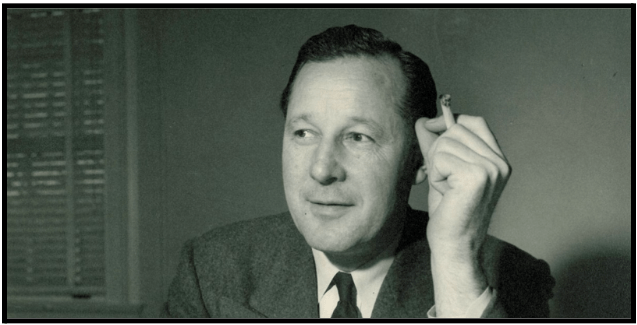Dale Carnegie wrote one of the world’s most famous books. Several decades ago editors removed the final section. This is a recap of what got cut.
Talking Big Ideas.
There was a young couple named Arthur and Evelyn, and they were committed to building a loving marriage.
Evelyn joined a ladies’ group at their church. The women decided to each ask their husbands for six ways they could be better wives. Over dinner that night Evelyn told Arthur about her homework, and he said he’d like to take the evening to consider it and give his six suggestions in the morning.
Arthur was in a self-improvement group at the local YMCA, and his homework was to resist criticizing people while leaning into heartfelt appreciation. So he woke up early the next morning, called the florist, and had them send six red roses to his house with a note: “Evelyn, I can’t think of six things I’d like to change about you. I love you just the way you are.”
He told his group: “Frankly, it would have been easy for me to list six things I would like to change about Evelyn – my heavens, she could have listed a thousand things she’d like changed about me!”
When Arthur arrived home after work, Evelyn greeted him at the door, filled with gratitude and nearly in tears. At church the following Sunday, several women surrounded Arthur to say that what he did for Evelyn was one of the sweetest things they’d ever heard.
Arthur’s YMCA group was run by Dale Carnegie, a communications expert who wrote How to Win Friends and Influence People – a timeless classic with more than 30 million copies sold. Today, Carnegie is recognized as the greatest public speaking coach in American history, with testimonials from countless people worldwide.
For example, billionaire philanthropist Warren Buffett says the Dale Carnegie course he took in the 1950s transformed his life. He was so moved that he proposed to his wife during the course, and nearly seventy years later, he still has his certificate hanging on his office wall and recommends that all young people take similar classes.
Originally published in the 1930s, How to Win Friends and Influence People was rewritten in the 1980s per Carnegie’s wishes to keep the language and stories current. Substantive portions of the book were removed, including the final section, Seven Rules for Making Your Home Life Happier.
I own an early version of the book and thought it would be fun to highlight the Seven Rules for you.

Rule #1: Don’t, don’t nag!!!
The repetition and triple exclamation points are his.
Carnegie writes: “Neither royalty nor beauty can keep love alive amidst the poisonous fumes of nagging. . . . Of all the sure-fire, infernal devices ever invented by all the devils in hell for destroying love, nagging is the deadliest. It never fails. Like the bite of the king cobra, it always destroys, always kills.”
He gives us several examples of nagging spouses. Abraham Lincoln’s wife, for instance, constantly pointed out his perceived faults. She told him he was stoop-shouldered and walked awkwardly “like an Indian.” She mocked his ears, hands, and feet for being too large and his head for being too small. His nose wasn’t straight, she nagged, and his lower lip stuck out. She even tossed hot coffee in his face in front of others. Poor Lincoln would find any excuse to avoid being in her presence, even preferring ratty motels alone to the company of his wife.
Nagging isn’t just toxic, it’s ineffective. “There is only one way under high Heaven to get anybody to do anything. Did you ever stop to think of that? Yes, just one way. And that is by making the other person want to do it.”
Marital graves, we are told, are made with lots of little digs.
#2: Don’t try to make your partner over.
We cannot change our spouses, we can only change ourselves.
Carnegie brings us to the marriage of U.K. Prime Minister Benjamin Disraeli and his wife Mary Anne. She said, “My life has been one long scene of happiness.” They enjoyed a lifetime of love and never tried to change each other. Carnegie added, “Mary Anne wasn’t perfect. But Disraeli was wise enough to let her be herself.”
Before marriage, we must work hard to find the right person. After marriage, we must work hard to be the right person.
#3: Don’t criticize.
Carnegie writes, “Any fool can criticize, condemn, and complain – and most fools do. But it takes character and self-control to be understanding and forgiving.”
Instead of criticizing, we can pause and honestly try to understand our partner. We can view any situation from a distance as we try to figure our partner out.
Criticism breeds resentment and pulls couples apart.
#4: Give honest appreciation
According to William James, the father of modern psychology, “The deepest principle in human nature is the craving to be appreciated.”
Carnegie tells us that he once fasted for six days without eating. How many spouses are starving right now for the appreciation they crave? Have you gone six days without giving your partner appreciation? Sadly, some go six years or even six decades.
We are told that upper-class French boys were taught to compliment a woman’s wardrobe several times during an evening. Russians during the Czarist period had a custom at restaurants of asking to speak to the cook so they could compliment their work.
Carnegie says we should learn from the French and Russians in this regard and make it a habit to compliment our spouses in all matters, big and small.
He drives home the importance of distinguishing between appreciation and flattery:
The difference between appreciation and flattery? That is simple. One is sincere and the other insincere. One comes from the heart out; the other from the teeth out. One is unselfish; the other selfish. One is universally admired; the other is universally condemned.

#5. Pay little attentions.
When was the last time you gave your spouse a gift?
“Why wait until your wife goes to the hospital to give her a few flowers? Why not bring her a few roses tomorrow night?” Or even better, why not surprise your spouse with a gift today?
Little attentions show our spouses that we are thinking of them and want to make them happy. Carnegie says that “too many men underestimate the value of these small, everyday attentions . . . That’s what marriage is in the long run – a series of trivial incidents.”
Ignoring little moments creates distance and disconnection.
#6. Be courteous.
We are told that courtesy is the “quality of heart that overlooks the broken gate and calls attention to the flowers in the yard beyond the gate.”
By contrast “rudeness is the cancer that devours love. Everyone knows this, yet it’s noteworthy that we are more polite to strangers than we are to our own relatives.”
Carnegie says that in Holland it is customary to leave shoes outside before entering a house: “We could learn a lesson from the Dutch and shed our workday troubles before we enter our homes.”
Treat your spouse the way they want and deserve to be treated.
“Courtesy is just as important to marriage as oil is to your motor.”
~ Dale Carnegie
#7: Read a good book on the sexual side of marriage.
Happy marriages do not happen by chance. They are the result of effort and deliberate action. This includes learning how to please our spouses mentally, emotionally, spiritually, and physically.
Carnegie tells us that sex is a small but vital part of a healthy marriage.

Overall, I think Carnegie’s advice holds up. It’s through the power of attraction rather than coercion that people are drawn to us and allow us to gain influence over them.
We’d all benefit from applying his Seven Rules. I do find it funny that the most iconic self-help book in history – one of the best-selling books of all time – ends by saying to go read a good book on sex.
While physical intimacy gets a full chapter, listening is not mentioned, nor is solving problems as a team or building a world of shared meaning.
I’ll never forget during the pandemic when Maryrose and I lived in the bus and were parked in a remote desert outside Joshua Tree National Park. We dug a pit in the dirt outside the bus, built a fire, and had a beautiful and deep conversation late into the night guided by the Gottman book 8 Dates.
Carnegie would have loved all the Gottman books.
He would have recommended Gary Chapman’s The Five Love Languages and encouraged us to take the free online quiz. Carnegie believed we should work to understand our audiences and tailor our communication to them. That’s exactly what love languages do for spouses.
We’ll explore this more in future pieces.
***




